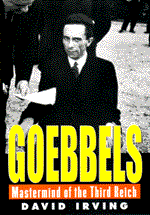|
Edward Marr asks, Wednesday, November 21, 2007, for the low-down on the Nazi assassination of Austrian chancellor Engelbert Dollfuss in July 1934
Photo: Benito Mussolini and friend, Engelbert Dollfuss
What was really Hitler's part in the 1934 murder of Dollfuss? I AM conducting my IB [International Baccalaureat] History coursework on the events surrounding the assassination of [Austrian Chancellor Engelbert] Dollfuss. I am particularly intrigued by your argument that the Führer had not ordered the murder of the Chancellor, as seen from the brief entries in the diary of Dr. Joseph Goebbels on the dates surrounding this pivotal event in European history. (http://www.fpp.co.uk/History/General/Dollfuss.html ). I would be fascinated to know whether there is any other evidence to suggest that this was indeed the case as I seem to be struggling to find my way through an abundance of material implicating the Fuhrer, or where I can find any more extensive material.
 David Irving replies: THE most important material is the memoirs of Generaloberst Wilhelm Adam, unpublished, who was with Hitler that evening. I use the manuscript in my Hitler biography. The original, preserved for many years after the war in a Bavarian monastery, is now in the Institut für Zeitgeschichte archives in Munich as file ED109/2, which allowed me to read it exclusively many years ago. Check out my descriptions in my biographies of Goebbels and Hitler and Hitler prewar (The War Path). I was the first historian to get the Joseph Goebbels Diaries on this episode.
Although he would protest his innocence in later years, there is no doubt that he was fully apprised of the coup being prepared by Austrian Nazis under Theo Habicht. Habicht claimed army backing for a plot to replace the dictatorial chancellor Dr Engelbert Dollfuss with Dr Anton Rintelen, a prominent right-wing politician. Goebbels' unpublished diary shows that he considered Habicht a hothead whom Hitler, as was typical of his indecisiveness, was hanging on to far too long. When Habicht brought the latest news on Austria on April 10, Goebbels again decided: 'He's obviously not up to the job.'[36] After discussing Austria with Habicht and Haegert two weeks later Goebbels noted: 'We'll be intervening there more strongly now. Otherwise dilettantism rules.'[37] Intervene -- but how? Attending Bayreuth for the annual Wagner festival on Sunday July 22, he found Hitler conferring secretly with Habicht, Rosenberg, General Walther von Reichenau and the former S.A. commander Franz Pfeffer von Salomon. They had decided on a coup. In his diary Goebbels inked the terse comment: 'Will it come off? I've very sceptical.'[38] For three days they went their normal ways: Hitler entertained Goebbels and the others by reading from his Landsberg prison notes, and talking of the past; once they all went for a picnic in the forests. Back at the Wagner household, Goebbels had a little scene with Magda whom he caught 'snooping' through his mail. The coup was to take place the next day, Wednesday July 25. General Wilhelm Adam, army commander in Bavaria, was ordered to report at nine A.M. on Wednesday morning to Bayreuth, where Hitler boasted to him that the Austrian army was going to overthrow the Dollfuss government that day: Adam was to arm all the Austrian Nazis who had fled to Germany. The army general was also deeply sceptical. Goebbels was with Hitler as the first reports came in from Vienna. Things were soon going badly wrong just as he had feared: 'Big rumpus. Colossal tension. Awful wait. I'm still sceptical. Pfeffer more optimistic. Habicht too. Wait and see!' The word was that Habicht's Nazis had seized Dollfuss and his minister of the interior Emil Fey in a scuffle. Hitler put through endless phone calls to Berlin, because lines to Vienna were dead. At three P.M. he phoned General Adam: 'Everything is going according to plan in Vienna,' he lied. 'The government building is in our hands. Dollfuss has been injured -- the rest of the news is confused as yet. I'll phone again.' He never did; he and Goebbels listened to Wagner's 'Rhinegold' that afternoon with only half an ear. Then came uglier news: Dollfuss had been shot dead, and the rebels were pulling out. 'Habicht was all talk,' decided an outraged Goebbels. 'I just manage to suppress a crazy communiqué by Pfeffer.' Pfeffer and Habicht were very mute after this. Goebbels switched the propaganda ministry over to emergency damage control. The foreign ministry blamed the German ambassador and recalled him. 'Führer remains quite calm,' observed Goebbels. 'Casting new plans. Dollfuss is out: that's a serious blow to the Austrian regime.' They tore up their remaining Wagner tickets and returned to Berlin the next day. Mussolini -- who had secretly approved the idea of ousting Dollfuss -- was furious at the murder, and sent his army to the Austrian frontier. The Italian press waded into the Nazis. Goebbels ordered his press to hit back. Hitler was angry that Mussolini had changed his tune. 'It's all over with Italy,' Goebbels decided. 'The same old disloyalty. The Führer has washed his hands of them.' As
a bloodbath began in Austria, he persuaded Hitler
to dismiss the bungling, cynical dilettante Habicht
if not actually shoot him; Papen was sent as
special ambassador to Austria. Late on July 27
Hitler spoke to Goebbels about the future: 'He has
a prophetic vision,' wrote the minister. 'Germany
as master of the world. Job for a century.' The
assassins were publicly hanged in Vienna. Source notes:
| ||||||||||

